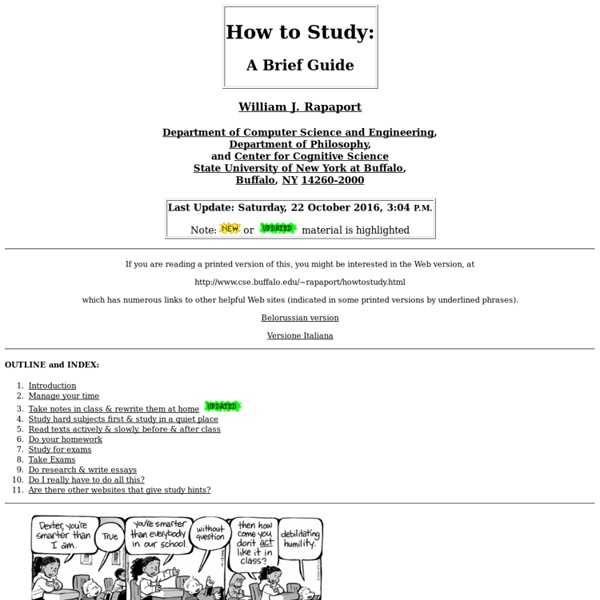How to Study
by Ronald C. Blue Countless times students have asked me what is the best way to study. While the recommendations that I am about to make to you are no guarantee of success, I believe they will optimize your chances of success. Perspectives on the problem: Research shows that the average student will study for a test. College is different. It takes about one year to learn how to learn at a college level. 22 hours for an A (6 hours per week) 16 hours for a B (4 hours per week) 14 hours for a C (3.5 hours per week) 10 hours for a D (2.5 hours per week) 0 hours for an F (0 hours per week) An hour of study is defined as studying for 45 minutes and a break of 15 minutes. Research suggests that the slowest 10 percent of the students may need 5 to 6 times as much time to learn the same material as the fastest 10 percent. In other words, you can succeed if you pay the price necessary for success. The price of success: The price is too high you say. How to get started: Believe you can succeed. Survey:
10 Highly Effective Study Habits
Students grapple with many issues in their lives, and because of all of the competing things for your attention, it’s hard to concentrate on studying. And yet if you’re in school, you have to do at least a little studying in order to progress from year to year. The key to effective studying isn’t cramming or studying longer, but studying smarter. 1. Too many people look at studying as a necessary task, not an enjoyment or opportunity to learn. Sometimes you can’t “force” yourself to be in the right mindset, and it is during such times you should simply avoid studying. Way to help improve your study mindset: Aim to think positively when you study, and remind yourself of your skills and abilities. 2. A lot of people make the mistake of studying in a place that really isn’t conducive to concentrating. The library, a nook in a student lounge or study hall, or a quiet coffee house are good places to check out. 3. Dr. APA Reference Grohol, J. (2006). 10 Highly Effective Study Habits.
Effective Study Skills
Everyone is different, and for some students, studying and being motivated to learn comes naturally. If you are reading this page, it's likely that you are not one of them, but don't despair, there is hope! Your success in high school and college is dependent on your ability to study effectively and efficiently. The results of poor study skills are wasted time, frustration, and low or failing grades. It's your life, your time, and your future. This guide is designed to help you develop effective study skills. Effective Study skills are about more than understanding Effective study skills must be practiced in order for you to improve. The value of a schedule Before you even begin to think about the process of studying, you must develop a schedule. A schedule saves time All schedules should be made with the idea that they can be revised. Making every hour count A schedule should take into account every class, laboratory, lecture, social event, and other work in which you engage. Strategies
Study Skills | Critical thinking at university
Critical thinking at university Students often ask why critical thinking is required at university and what it means to be a critical thinker. Critical thinking has been variously defined but the following two definitions may help you to understand it better. Critical thinking is a process, the goal of which is to make reasonable decisions about what to believe and what to do (p.xvii). Ennis, R. H 1996, Critical thinking, Prentice-Hall, NJ. Critical thinking is evaluating whether we should be convinced that some claim is true or some argument is good, as well as formulating good arguments. p. 5 Epstein, Richard L, 2005, Critical thinking, Wadsworth Publishing, Belmont, CA. Open All (to print) | Close All Weighing up alternatives in order to make decisions is part of the critical thinking process. Buying a car Choosing where to go for a holiday Selecting a university course Moving to a different city Critical thinking involves active involvement. Watch the following video:
5 Bad Study Habits - Bad Study Habits You Should Avoid
Have you ever wondered how you can bomb a test after studying for hours? A poor test result after many hours of faithful studying is a real confidence buster! If this happens to you, it’s possible that your current study habits are failing you! But you can turn it around. The process of learning is still a little mysterious, but studies do show that the most effective process for studying involves highly active behavior over a period of time. In other words, to study effectively, you must read, draw, compare, memorize, and test yourself over time. The following study habits are least helpful when used alone. 1. Linear notes are lecture notes that students take when they attempt to write down every word of a lecture. You may be wondering: How can it be bad to capture every word of a lecture? It’s not bad to capture every word of a lecture, but it is bad to think you’re studying effectively if you don’t mess with your linear notes in some way. 2. Are you guilty of highlighter abuse? 3. 4. 5.



